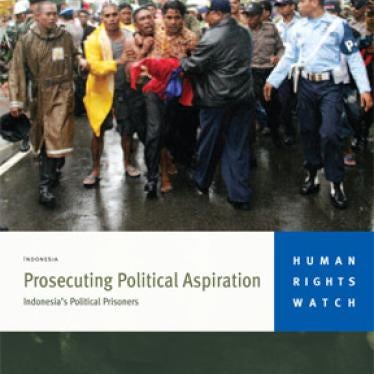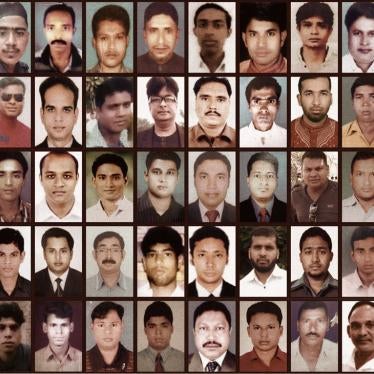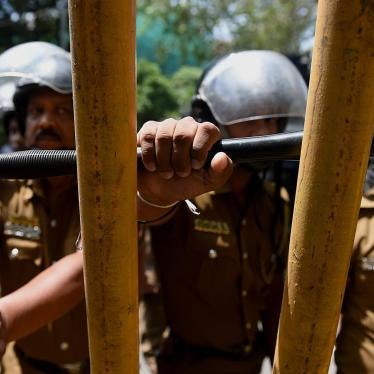(New York) - A mobile phone video showing apparent torture of two Papuan men highlights the need for the Indonesian government to credibly investigate serious human rights violations and hold those responsible accountable, Human Rights Watch said today.
Human Rights Watch is not able to verify the authenticity of the video but believes that there is sufficient basis for an official investigation. The 10-minute video shows two men who are speaking in the Lani dialect of Papua with their arms bound behind their backs, lying on a dirt road. They are surrounded by men in plain clothes carrying a weapon and communications equipment commonly used by Indonesian soldiers.
The interrogators ask questions in the country's primary language, Bahasa Indonesia, that are consistent with those commonly asked by security forces in the region, who are often seeking information about alleged arms caches and Free Papua Movement (OPM) insurgents. The abuses shown - beatings, threats with weapons, stabbing - are also consistent with frequent reports from Papua of human rights violations committed by the security forces.
"The grotesque torture shown in this video demands an immediate and credible investigation, not the whitewash of an internal military investigation," said Phil Robertson, deputy Asia director at Human Rights Watch. "All those responsible for what appears to be a horrific crime need to be brought to justice, and the public needs to see that justice is done."
Local sources in Papua believe that the incident probably took place near Tingginambut in Puncak Jaya regency and that the two men who were tortured were Tunaliwor Kiwo, about age 50, and Telangga Gire, 30, both local villagers. Data on the video indicates it was taken at 1:26 p.m. on May 30, 2010.
In Jakarta, leading members of the national parliament said they would summon the national military commander, Adm. Agus Suhartono, to explain the video at a parliamentary hearing. Suhartono and a military spokesman in Papua said that the military will investigate.
The Indonesian military justice system, which largely has exclusive jurisdiction over military personnel, lacks transparency, independence, and impartiality, Human Rights Watch said. Over the years, Indonesia's military courts have failed to investigate adequately or to prosecute alleged serious human rights abuses by military personnel. In the few military trials for which information is publicly available, military prosecutors brought relatively insignificant charges, and any sentences handed down by military judges have been extremely lenient. Human Rights Watch urges the government to support legislation proposed in parliament to bring the military court system fully under the effective control of civilian criminal courts.
"It's hard to tell what's more shocking about the video - the horrific abuses depicted or the perpetrators' apparent confidence that their actions are acceptable," said Robertson.
In the video, the man identified as Kiwo is stripped to his underwear. His interrogators demand information about weapons. Kiwo responds that he is only a civilian from Tingginambut and knows nothing about weapons. After two minutes, the men begin to kick him in the face and to press his chest with their sandals and boots. The video then shows Gire on the ground nearby as an interrogator repeatedly slaps his face and presses a knife against his nose and neck. After a short period, the video focuses on Kiwo, and the interrogators are heard shouting in Bahasa Indonesia, "Burn his penis! ... Burn his penis!" Kiwo screams as a piece of burning wood is repeatedly jabbed at his genitals.
Kiwo continues screaming until an interrogator points his semi-automatic rifle at Kiwo's mouth and says, "Shut up ... shut up. I'll shoot ... I'll shoot your mouth." Kiwo stops, and then the interrogator is heard saying: "You're honest, huh? Now show your weapon. Bring me to your weapon. I'll burn your penis again ... Where are the weapons? Do you keep them in your church? In your house? In the jungle? In the river? Buried underground? You just tell me. Be honest. We're peace-loving people."
According to local Papuan sources, Kiwo remains unaccounted for, while Gire and his family have now gone into hiding. Human Rights Watch called on the Indonesian government to take all necessary steps to uncover the whereabouts and fate of Kiwo and ensure the safety of Gire and his family members.
Human Rights Watch urged donor countries such as the United States, Australia, and the United Kingdom that are providing assistance to Indonesian security forces, to press the Indonesian government for an impartial and credible investigation that results in appropriate prosecutions of all those implicated. US restrictions on military assistance to Indonesia were lifted in recent years; in 2010, the US ended a decade-long ban on military assistance to Indonesia's abusive special forces.
"Ensuring accountability in this case is a key test not only for the Indonesian government, but for all those who provide military assistance," said Robertson. "The credibility of the government, the military, and those who provide military assistance are all at stake."







